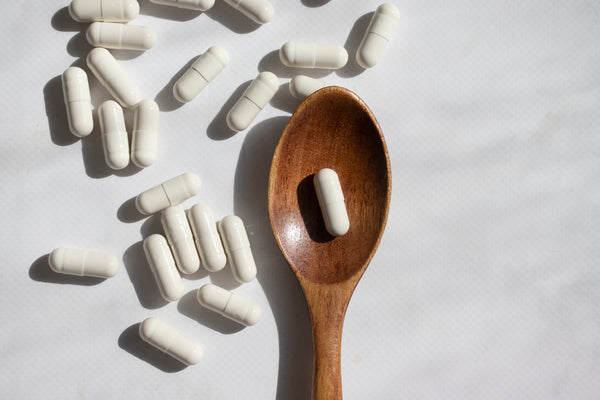Probiotics have garnered significant attention for its support for our digestive systems and beyond. Among the myriad of benefits they offer, relieving bloating and gas stands out prominently. However, with a plethora of probiotic strains flooding available, navigating through the options can be overwhelming. In this comprehensive guide, we'll delve into the role and benefits of probiotics, explore how they specifically target bloating and gut health, and ultimately identify the best probiotics for combating these discomforts.
The Role and Benefits of Probiotics
Before we dive into specific strains, it's crucial to understand the broader role and benefits of probiotics. These live microorganisms, often referred to as "good bacteria," inhabit our gut and play a pivotal role in maintaining digestive health. By fostering a balanced gut microbiome, probiotics can help improve digestion, enhance nutrient absorption, and bolster immune function. Additionally, they help counteract the effects of harmful bacteria, helping to reduce the risk of gastrointestinal issues like constipation, diarrhea, gas and bloating.
Causes of Bloating
Bloating can arise from a multitude of factors, ranging from dietary choices to underlying medical conditions. Consuming gas-producing foods, such as beans, cruciferous vegetables, and carbonated beverages, can contribute to bloating, as can overeating or eating too quickly, which can lead to swallowed air accumulating in the digestive tract. Intolerance or allergies to certain foods, such as lactose or gluten, may also trigger bloating in susceptible individuals. Moreover, conditions like irritable bowel syndrome (IBS) are commonly associated with bloating due to disruptions in gut motility and microbial balance. Hormonal fluctuations, particularly for women during menstruation or pregnancy, can further exacerbate bloating symptoms. Stress and anxiety may also play a role by influencing gut function and exacerbating gastrointestinal symptoms. Identifying and addressing the underlying causes of bloating is essential for effective symptom relief.
How Probiotics Help Bloating and Gut Health
Bloating and gas are common symptoms that can stem from various factors, including diet, lifestyle, and underlying gastrointestinal conditions. Probiotics exert their beneficial effects on bloating and gut health through multiple mechanisms:
-
Regulation of Gut Microbiota: Probiotics help restore equilibrium in the gut microbiota by inhibiting the growth of harmful bacteria and promoting the presence of beneficial bacteria. This rebalancing action can alleviate digestive disturbances, including bloating and gas.
-
Fermentation of Fiber: Certain probiotic strains possess the enzymatic machinery necessary for fermenting dietary fiber. Through this process, they produce short-chain fatty acids (SCFAs), such as butyrate, acetate, and propionate, which nourish the cells lining the colon and exert anti-inflammatory effects, thereby reducing bloating and improving overall gut health.
-
Enhancement of Digestive Processes: Probiotics facilitate the breakdown of complex carbohydrates and proteins, aiding in their digestion and absorption. By enhancing digestive processes, they mitigate the chance of undigested food fermenting in the gut and producing excess gas, which can lead to bloating.
Best Probiotics for Bloating

Lacticaseibacillus rhamnosus
This strain has demonstrated promising results in reducing bloating and abdominal discomfort in individuals with IBS and other gastrointestinal conditions. A study explored how Lactobacillus rhamnosus protects the gut barrier. They found that it helps maintain the mucus layer and gut cell health, reduces inflammation, and enhances gut function. This suggests that Lactobacillus rhamnosus could be beneficial for gut health by supporting its protective functions and reducing inflammation.
Lactobacillus acidophilus
Known for its ability to promote overall digestive health, L. acidophilus may help alleviate bloating by modulating gut microbiota and enhancing intestinal motility. In an 8-week double-blind, placebo-controlled clinical trial, researchers administered Lactobacillus acidophilus and Bifidobacterium lactis. The study revealed significant improvements in abdominal bloating for patients with functional bowel disorders (FBD) compared to a placebo, emphasizing the potential of specific probiotic strains in managing FBD symptoms and underscoring the role of gut bacteria in digestive health.
Lactiplantibacillus plantarum
With its anti-inflammatory properties and capacity to ferment a wide range of substrates, L. plantarum contributes to gut health and may alleviate bloating associated with IBS and other digestive issues. In a randomized trial, participants with diarrhea-predominant IBS symptoms were given Lactiplantibacillus plantarum from green tea leaves or a placebo for four weeks, followed by a two-week follow-up. L. plantarum intake significantly improved global relief of symptoms, severity and frequency of abdominal pain, bloating, feeling of incomplete evacuation, and diarrhea frequency, while also increasing the relative abundance of Lactobacillus in the gut microbiome, thereby enhancing the quality of life and intestinal health in IBS patients.
Bifidobacterium animalis
This probiotic strain has been shown to help reduce bloating and abdominal discomfort in individuals with functional gastrointestinal disorders, such as IBS. A review explores how Bifidobacterium animalis subsp. lactis supports gut health by preventing diarrhea and improving bowel function in conditions like constipation. It does so by maintaining intestinal barrier function, regulating immune responses, and modulating the gut-brain-microbiota axis, offering potential relief for gut motility-related disorders.
Bifidobacterium longum
B. longum is recognized for its role in supporting gut health and alleviating gastrointestinal symptoms, including bloating and gas. Bifidobacterium has shown promise in preventing and protecting against inflammatory bowel disease. A study suggests the strain achieves this by modifying the gut microbiota, regulating immune responses, reducing inflammation, and maintaining intestinal barrier function.
Bacillus coagulans
This spore-forming probiotic exhibits robust survivability in the gastrointestinal tract and may help alleviate bloating and gas by promoting gut microbiome balance. It aids digestion by producing enzymes, balances gut bacteria, and boosts the immune system, making it a potential preventive or therapeutic option for various digestive issues.
Limosilactobacillus reuteri
L. reuteri has been studied for its potential to improve digestive health and alleviate symptoms of bloating and gas, particularly in individuals with gastrointestinal disorders. Clinical studies have shown that L. reuteri can modulate gut microbiota, combat infections, and alleviate symptoms of conditions like irritable bowel syndrome and inflammatory bowel disease in both adults and children. Its use has been associated with shorter durations of acute diarrhea, improved abdominal pain in colitis patients, and enhanced gut motility in cases of chronic constipation.
Guide to Probiotic Supplements
When selecting a probiotic supplement to address bloating and gas, consider the following factors:
-
Strain Specificity: Look for supplements containing strains with documented efficacy in alleviating bloating and gas, such as those mentioned above. In addition, look for probiotic supplements with a variety of strains to promote diversity of beneficial bacteria in the gut.
-
CFU Count: Ensure that the supplement provides an adequate colony-forming unit (CFU) count to deliver therapeutic benefits. While there is no right or wrong CFU count, probiotic supplements are commonly available in CFU ranges of 5 - 100 billion.
-
Quality and Purity: Opt for dietary supplements manufactured by reputable companies that adhere to stringent quality control standards and third-party testing for purity and safety.
Other Natural Remedies for Bloating and Gas

Incorporating a combination of probiotics, prebiotics, and other natural remedies into one's diet and lifestyle can offer comprehensive support for digestive health and alleviate bloating and gas discomfort.
- Prebiotics: In addition to probiotics, prebiotics also play a significant role in managing bloating and gas. Prebiotics are non-digestible fibers that act as food for healthy gut bacteria, promoting their growth and activity. Foods rich in prebiotics, such as onions, garlic, bananas, and oats, can help support a healthy gut microbiome and alleviate bloating and gas symptoms.
- Herbal Teas: Other natural remedies like herbal teas, such as peppermint or ginger tea, can provide relief by soothing the digestive system and reducing bloating discomfort.
- Dietary Modifications: Certain dietary modifications, such as reducing intake of gas-producing foods like beans and carbonated beverages, and practicing mindful eating habits, such as chewing food thoroughly and avoiding overeating, can also help mitigate bloating and gas issues.
Wrapping Up
Probiotics may offer a promising avenue for alleviating bloating and gas by modulating gut microbiota, enhancing digestive processes, and exerting anti-inflammatory effects. When selecting a probiotic supplement, prioritize strains with documented efficacy, adequate CFU counts, and superior quality. By incorporating probiotics into your daily routine, you can promote digestive health and mitigate bloating and gas discomforts.
Whether you opt for any of the discussed strains or a combination formula that includes prebiotics and probiotics, remember that consistency and patience are key to reaping the full benefits of probiotics.